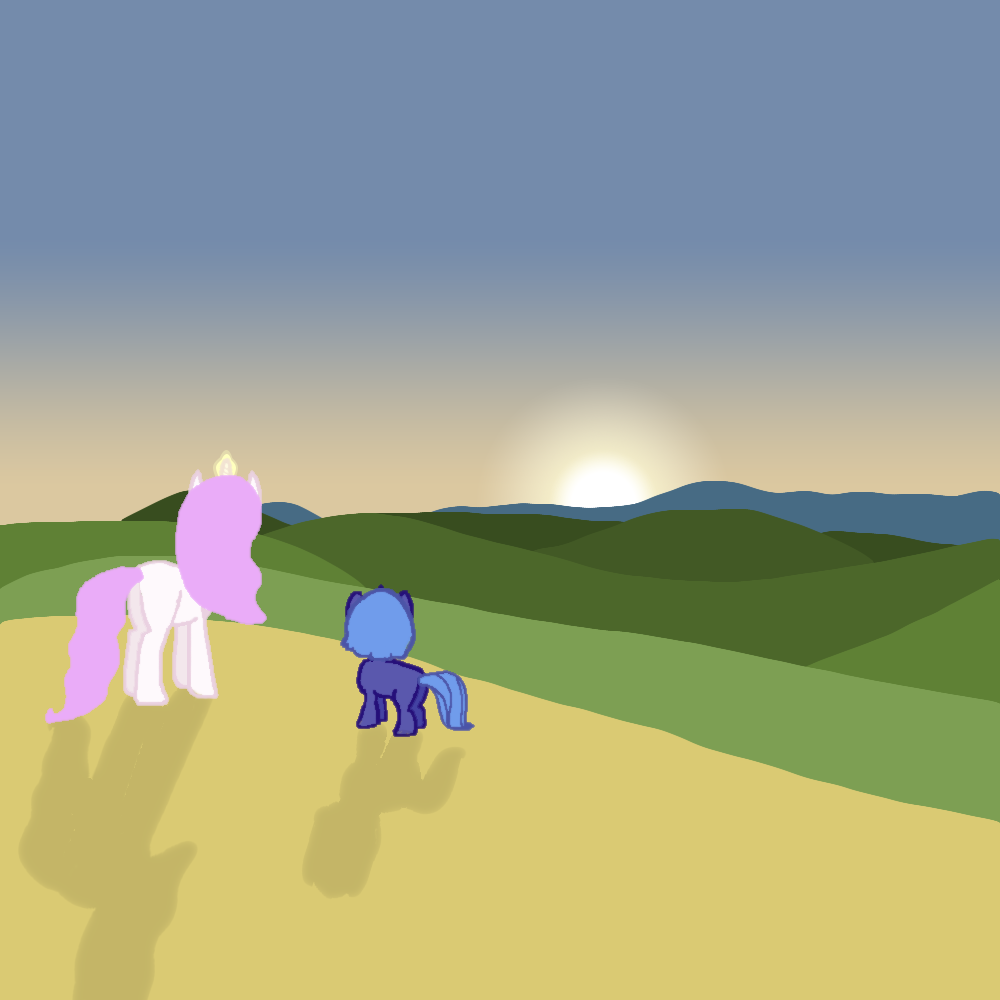The T-V Distinction, or how the French caused the Quakers to be attacked six hundred years after they conquered England · 11:00am Nov 11th, 2014
My most recent story, Dawn, talks a great deal about the implications of politeness held by the words you and thou. While the story teaches about the distinction between the words, and talks about how thou is insulting, if one was a linguistic nerd, one might wonder: why did the pronoun thou exist in the first place? Indeed, why is it that people see thou as being a formal word, if it was, in fact, so insulting?
Warning: history and language nerdiness awaits. And not the fun kind with ponies. If you want fun pony history, you’re better off reading about Celestia raising the sun.
Thou is not the formal form of you, but rather a word which has since been lost entirely in most dialects of English. It originated in Old English as þū; in that time, thou was used exclusively as the singular pronoun, while ge or ȝe (which later became the word ye; it was pronounced roughly like the Middle English word yea) was used as the plural pronoun when addressing a group of people (similar to the modern term y'all). Neither had any association with formality or politeness at that time; they were just the words to use, rather similar to I, he, she, or they.
After the Norman Invasion in 1066, the French-speaking Normans, who ruled over the English for many centuries, very strongly affected the English language and brought with them the t-v distinction. In French, tu is the informal, singular form of address for someone, while vous is the plural form and also used under most circumstances in polite or formal situations, especially with people you don't know very well. The French-speaking Normans heavily affected English, and thou became associated with tu, while ye (whose oblique case is you, akin to the I/me distinction) became associated with vous, likely because vous and you sound very similar.
Because of the association with the French forms, thou became seen as the informal, familiar form of address used to address intimates and subordinates, while "ye/you" became seen as being akin to the French "vous", something to be used to address groups of people as well as strangers and other individuals you don't know very well. This changed how ye/you was used, and because it was the polite form, people increasingly began to use it more and more often.
By 1600, ye/you was beginning to lose its distinction; the words were rather more similar than I/me, and people started just defaulting to use the word “you”. It is speculated that ye was also done away with in part because the early printing presses lacked the character thorn (þ, which sounds like th). Printers, being inventive sorts, used y in the place of þ. This is, in fact, the source of "Ye olde English" - the y is actually a þ, and it should be pronounced "The old English". As this would make the and ye look the same, using you in the place of ye would make text clearer, as both are very common words, especially when you are addressing an audience.
Because thou was seen as being disrespectful to use with you didn't know very well, people used thou less and less, and it got to the point where, at least amongst the upper classes, people started using it as an insult deliberately - to thou someone is to deliberately use an inferior form of address (thou) when you should be using a more formal form of address (you). As a result of this, people stopped using thou to avoid sounding like they were speaking down to people, and eventually the pronoun vanished almost entirely - only a few regional dialects preserve thou and thee, just as only a few preserve ye.
However, two very important works were written before this was complete – the King James Version of the Bible, and the works of Shakespeare.
Greek and Hebrew, the original languages of the Bible, have singular and plural distinctions, when people translated Bible into English, they used thou for the singular and ye/you for the plural in order to preserve the distinction, without regard to their sense of formality. As the King James Version of the Bible became extremely influential and was printed and reprinted over the years, thou remained in the Bible long after it had left the common vernacular, and acquired a sort of holy sense to it.
Likewise, Shakespeare’s works made use of thou and you; he also used ye, but somewhat infrequently and inconsistently, sometimes switching between ye and you when addressing the same character with the same character with no apparent rhyme or reason. The use of thou to address familiars or inferiors, or to be insulting, lends extra significance to some scenes. There is a neat scene in Richard III where King Richard uses the royal “we” while speaking to his subordinate, Sir James Tyrrell, and Tyrrell calls King Richard “ye” in response. Immediately afterwards, the King speaks to the Duke of Buckingham, calling himself “I” and being called “you” by the Duke in return.
Nowadays, because thou is almost entirely gone from the common vernacular, it has taken on a formal context which it did not possess in the time of Early Modern English; people perceive it as being, paradoxically, highly formal, when indeed it was quite the opposite and was viewed as informal at the time. But depending on the era – Early, Middle, or Early Modern – the significance of thou and ye/you changed significantly.
Now, I promised violence in the title of this post, and I would hate to disappoint. The Quakers, being a rather godly lot, and one of the ways in which they exhibited this godliness was by addressing each other – and indeed, everyone else – as thou/thee, as was found in the most holy of books, the Bible. To them, addressing everyone else as thee was just “plain speaking” – it was meant to show that everyone was on the same, familiar level with one another. Needless to say, given that everyone else had gone over to using the more polite term “you” in order to be egalitarian and universally polite, and that the people who wrote the Bible had ignored the implications of referring to someone as “thou” or “thee”, this caused some friction. The Quakers, rather than seeming to be egalitarian, instead sounded like they were speaking down to everyone else, or were acting overly friendly and familiar. Because people back then were very polite, this resulted in Quakers being beaten for their rudeness on several occasions, because what could be more polite than physical violence for a perceived slight?
And there you have it. A word, once used as an ordinary pronoun, later became a sign of intimacy or an insult, and then faded out of the language entirely because people just figured it was better to be polite all the time, possibly enforced by brutal mob violence. Now, because of its use in the Bible and Shakespeare, it is seen as more formal than you, but also extremely archaic, used only by priests, Quakers, and frogs.

And to think, he seemed so polite.
Now go read Dawn, and remember, the next time you see two knights thouing each other before a jousting match at your local Renaissance Fair, they're calling each other their inferior. No wonder they end up fighting. ![]()






And now I'm humming Frog's theme. I hope you're proud of yourself.
In any case, a great little history of archaic pronouns. Thank you for it.
2588013
I am definitely proud of myself. Frog has a great theme.
And I'm definitely glad that you found it interesting. Because we all know, if people didn't know about archaic pronouns, it would all be terribly confusing.
2588013
You made me listen to it. Now it is stuck in my head.
I hope you're proud of yourself.
Ah language always changing, where one word could be a kindness between brothers one generation, and a horrible insult the next. Makes the folks freaking out over such things look a bit silly.
In other news~
2588126
Very much so. If I must suffer the awesome, then you can suffer along with me.
2588126
2588232
You two really need to stop making me want to play this game again. I already have too many things on my plate as it is!
And thanks for the history lesson. I never knew that about 'thee' and 'thou.'
Wonderfully well researched. I never would have guessed the odd uses and contexts that these words have been put through before the two great literary works defined them for us today.
So it appears I was wrong. Thank you for the education.
2588392
It is a largely obscure linguistic point these days, so it is hardly surprising. The English language is full of weird stories like this because of its convoluted history.
2588527
Yeah, it is really weird how the use of the word has varied so much.
Coincidentally, I wrote a blogpost about how to speak like Princess Luna speaketh, which says basically this. It is not as good as my post about the physics of unicornteleportation.